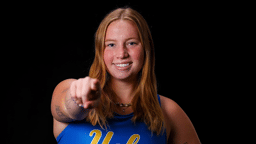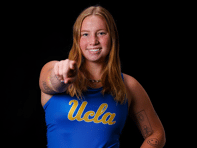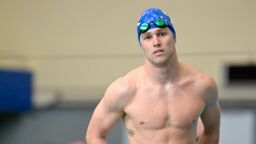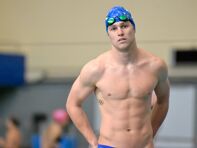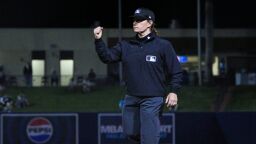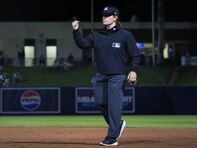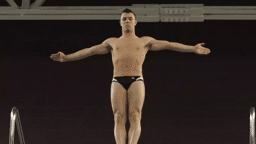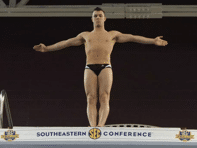Dwight Richardson felt like he couldn’t say anything about the racial jokes he had to endure on his swim team.
The teenage swimmer in Virginia was dealing with a lot of dynamics that already made him an outsider on his own team. The most obvious to everyone: He was Black. While he had tried other sports growing up, he simply didn’t have the coordination or skills to play football or baseball like his brothers.
He’d fallen in love with swimming, and no matter where he turned he always seemed to be the only Black competitive swimmer in the pool. On his team, he was one of one.
Richardson was also homeschooled. While his other teammates went to a couple of high schools together, Richardson didn’t have a bond with them before joining the team.
“Me being homeschooled I didn’t have a social clique like the other kids did,” Richardson told Outsports. “Most of my team went to this high school or that high school. I was the odd man out. They’d been swimming against each other since they were kids.”
The homeschooling also made him relatively unaware of social norms and interactions, which made him a bit timid. He just wasn’t used to interacting with a lot of kids his age.
Between being the only Black swimmer on the team, and being a bit of an outsider, that translated into strange or unfortunate interactions with many of his teammates early on. For one, he found they would often simply ignore him at times.
One evening a teammate was hosting the team at his house, and several of them were playing pool. When one of them said he needed a partner to play, Richardson offered to join in. His teammates put down their pool cues and walked out of the room. Richardson had no idea what just happened.
“I really didn’t understand the social cues.”
Underlying it, there seemed to be an element of racism. People on the team would wonder aloud why he was a Black guy in swimming, when the sport was so White. They’d also make racial jokes, with opposing teams even calling him the N-word.
It was a third dynamic that kept Richardson quiet about all of it.
“All my life, until I was 16 or so, the White kids didn’t want anything to do with me because I was Black, and the Black kids didn’t want anything to do with me because I ‘sounded White,’ so I was ‘gay,’ I was a ‘faggot.’”
The gay rumblings and teasing had gotten to Richardson throughout his childhood, and he had decided that to deflect the label he had to be as masculine as possible. To him, telling his parents or other adults about the racial harassment he was experiencing would be “snitching,” something he’d decided a masculine guy wouldn’t do.
So he kept it all in.
Even still, one day some of his teammates went way too far.
The team was warming up before a practice with some ropes and bands. One of his teammates configured a rope into what looked like a noose.
“Even at that time I think they knew they went too far.”
“Isn’t this what people used on Black people?” The teammate asked Richardson. They then slipped the rope around Richardson’s neck and led him around the room by it.
It wasn’t long before the swimmers realized what they were doing.
“Even at that time I think they knew they went too far,” Richardson said. “They started telling me that they would fuck me up if I said anything.”
The experience stung Richardson, and he went home that day wanting to move to a new team. He knew things weren’t right, he wasn’t being treated with any respect. And this one hurt more than the other times.
When he told his mother his escape plan, she gave him another option.
“You can go to another club,” she said. “Or you can stay on this team and whoop their asses in the water.”
That was his mom, always pushing him to push himself, to be stronger. It had inspired Richardson his whole life, and it drove him then to stick with the club and double his efforts in the water.
“That’s my baby,” his mom said.
So he put his nose to the grindstone and focused on becoming the best swimmer he could be. He knew that if he excelled in the water, respect would come.
It worked. The racial comments and actions shifted and the team began embracing him as a full teammate. He was even having teammates over to his house to hang out or for a meal.

“The comments stopped and the teasing stopped,” Richardson said. “By the time I graduated from high school I finally felt like I was part of something.”
Something indeed. He’d become a top-level swimmer, garnering the attention of college coaches, ultimately earning a spot on the Division II St. Andrews Presbyterian College. He eventually transferred to Wingate Univ., where he was on the national runner-up 200 freestyle relay two of his years with the Bulldogs.
It wasn’t until his senior season at Wingate that he finally felt the confidence to start coming out, sharing with a handful of people that he was bi, eventually realizing he was gay.
Now a model and high-end stylist living in Chicago out and proud, he gets his exercise playing dodgeball and kickball with Stonewall Sports, an LGBTQ sports organization in the city.
Hints of racism, unfortunately, have followed him into the gay community, he said. He experiences it in the dating scene and was even called the N-word in one of Chicago’s biggest gay bars.
Richardson still approaches incidents like that the same way he did when he was in high school.
“I still to this day have the mindset to just let things go.”
And maybe use it for a little motivation, just like in high school. It served him well then, and it’s serving him well now.
You can follow Dwight Richardson on Instagram @dwightgr88.








